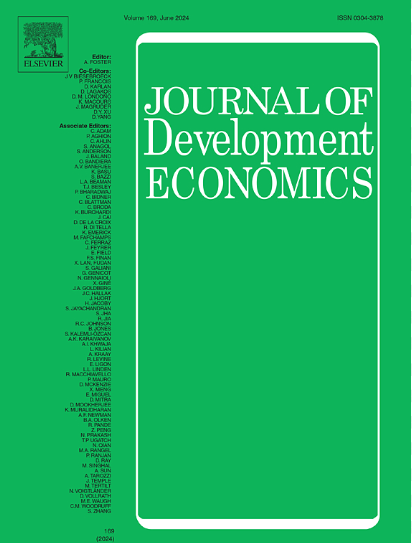牧民暴力、劳动力分配与农户性别反应
IF 4.6
1区 经济学
Q1 ECONOMICS
引用次数: 0
摘要
在尼日利亚,游牧民和定居农业社区之间发生暴力冲突,因为两个群体在土地和自然资源的使用上发生冲突,部分原因是气候变化。我们提出理论和证据来研究农户个体对与牧民有关的暴力的劳动反应,并考虑“暴力阴影”机制,即以前暴露于暴力事件会改变劳动对最近事件的反应。利用2010年至2019年的小组数据,我们强调了遭受暴力如何导致在种植或收获季节以及男性或女性之间的不同反应。在种植季节,在没有经历过牧民相关暴力的家庭中,我们发现,暴露(即单一暴露)导致家庭企业工作减少,但在有过暴露经历的家庭中,暴露(即反复暴露)导致家庭企业工作增加。与此同时,反复遭受与牧民有关的暴力只会减少男性的农业劳动。这导致总工作时间对单一暴露的反应下降,对反复暴露的反应增加,尤其是在女性中。在收获季节,我们发现单次暴露增加了男性和女性的农业劳动,但重复暴露只减少了男性的农业劳动。本文章由计算机程序翻译,如有差异,请以英文原文为准。
Herder-related violence, labor allocation, and the gendered response of agricultural households
Violent conflict between nomadic herders and settled agricultural communities in Nigeria occurs as both groups clash over the use of land and natural resources, in part, due to a changing climate. We generate theory and evidence to study the labor responses of individuals within agricultural households to herder-related violence and consider a “shadow of violence” mechanism, whereby previous exposure to a violent event alters labor responses to a recent event. Using panel data from 2010 through 2019, we highlight how exposure to violence can lead to differing responses in the planting or harvest seasons and among men or women. In the planting season, among both men and women living in households with no previous exposure to herder-related violence, we find that exposure (i.e., singular exposure) leads to a reduction in household enterprise work, but among households with previous exposure experience, exposure (i.e., repeated exposure) leads to an increase in household enterprise work. Meanwhile, repeated exposure to herder-related violence reduces agricultural work among men only. This leads total hours worked to decline in response to singular exposure and to increase in response to repeated exposure especially among women. In the harvest season, we find that singular exposure increases agricultural work among both men and women, but repeated exposure reduces agricultural work among men only.
求助全文
通过发布文献求助,成功后即可免费获取论文全文。
去求助
来源期刊

Journal of Development Economics
ECONOMICS-
CiteScore
8.30
自引率
4.00%
发文量
126
审稿时长
72 days
期刊介绍:
The Journal of Development Economics publishes papers relating to all aspects of economic development - from immediate policy concerns to structural problems of underdevelopment. The emphasis is on quantitative or analytical work, which is relevant as well as intellectually stimulating.
 求助内容:
求助内容: 应助结果提醒方式:
应助结果提醒方式:


